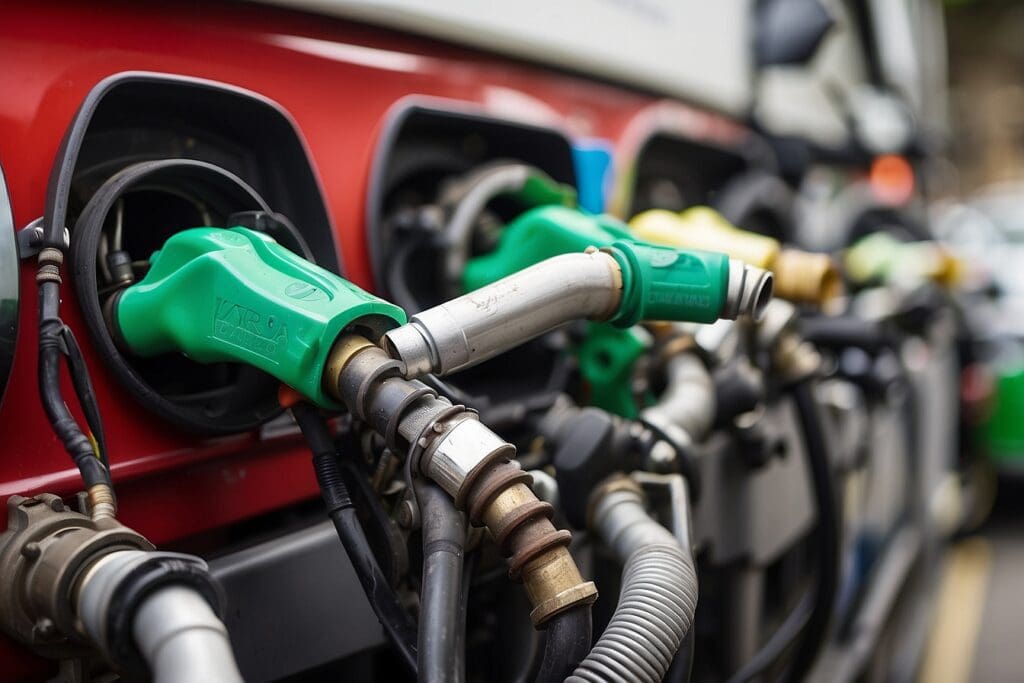As we navigate through these challenging times of skyrocketing fuel prices, it’s crystal clear that the quest to make our petrol budget stretch further is a universal concern. We’re all in this together, feeling the pinch each time we fill up and relentlessly scouring for answers.
Our expedition today leads us into an exciting realm where state-of-the-art technology isn’t just enhancing fuel efficiency but also forging a path towards more sustainable travel.
Keep your eyes peeled as we delve into pioneering innovations designed to ensure that every pound spent on petrol propels us further than ever before!
Key Takeaways
- Electric vehicles (EVs) are a game – changer in reducing emissions and reliance on fossil fuels, with ongoing improvements in battery technology enhancing their range and performance.
- Advanced combustion engines and vehicle light-weighting contribute significantly to fuel efficiency by optimising fuel usage and reducing the overall weight of vehicles.
- New mobility options like ride-sharing services and electric scooters offer convenient, lower-emission alternatives for both short-distance travel and optimised vehicle use.
- The cost-effectiveness of various technologies, including EVs and advanced engine designs, is evaluated based on long-term savings and environmental benefits.
- Future transportation advancements include self – driving trucks that can further optimise fuel consumption through efficient driving practices.
The Importance of Fuel Efficiency

Fuel efficiency is crucial in reducing greenhouse gas emissions and saving money on fuel costs. Decreasing dependence on fossil fuels is also a significant benefit of enhancing fuel efficiency.
Reducing greenhouse gas emissions
We have a vital role to play in curbing greenhouse gas emissions, which are major contributors to global warming and climate change. By embracing energy-efficient technologies and fuel management systems, we actively reduce our carbon footprint.
Electric vehicles represent a significant leap forward, using clean energy sources instead of traditional fossil fuels that release harmful gases into the atmosphere.
Harnessing renewable energy for transportation enables us to drive the change towards sustainable commuting practices. Hybrid vehicles also offer an effective transition by combining conventional engines with electric power, leading to substantial cuts in emissions.
Every step we take towards more fuel-efficient engines and tire technologies contributes positively to protecting our environment, assuring us of cleaner air and a healthier planet for future generations.
Saving money on fuel costs
Transitioning from reducing greenhouse gas emissions to saving money on fuel costs, it’s important to consider the financial benefits of prioritising fuel efficiency. Efficient use of fuel directly translates into reduced expenses for vehicle owners.
By embracing technologies such as electric vehicles, advanced combustion engines, and new mobility options, individuals can effectively lower their spending on fuel. Additionally, integrating energy-efficient technologies and implementing eco-friendly driving habits can lead to significant cost savings over time.
Incorporating these strategies not only supports environmental conservation but also provides tangible financial benefits for both consumers and businesses.
Decreasing dependence on fossil fuels
Transitioning from seeking ways to save money on fuel costs, we are also committed to decreasing our dependence on fossil fuels. Embracing energy-efficient technologies and alternative fuel sources is essential for reducing carbon emissions and promoting sustainable transportation.
By investing in emerging technologies for higher fuel economy and supporting eco-friendly driving habits with technology, we contribute to a greener future. Moreover, advocating for the use of electric vehicles and exploring innovative solutions such as self-driving cars can significantly diminish our reliance on traditional fossil fuels.
Our pursuit of decreasing dependence on fossil fuels aligns with the urgent need to address environmental impact while bolstering sustainable development. As environmentally conscious individuals, supporting conservation and various alternative energy sources is crucial in combatting climate change and creating a healthier planet for future generations.
Technology’s Impact on Fuel Efficiency
The impact of technology on fuel efficiency is significant, with advancements in electric vehicles, new mobility options, advanced combustion engines, and vehicle light-weighting all contributing to better fuel economy.
These technologies are essential in reducing greenhouse gas emissions and decreasing our dependence on fossil fuels.
Electric vehicles
Electric vehicles offer a promising solution to reducing greenhouse gas emissions and minimising our dependence on fossil fuels. These vehicles run on electric motors powered by rechargeable batteries, reducing the need for traditional petrol-powered engines.
This technology significantly contributes to energy conservation and green technology efforts in transportation. Additionally, the continuous advancements in battery technology contribute to improvements in the range and performance of electric vehicles, making them a viable option for environmentally conscious individuals seeking fuel-efficient transportation options.
The development of electric vehicles aligns with our commitment to promoting eco-friendly driving habits through high-quality software solutions and new tyre technologies. Embracing this sustainable transport alternative supports our collective effort to reduce carbon emissions and foster a more environmentally friendly future for all.
New mobility options
New mobility options, such as ride-sharing services and electric scooters, are revolutionising transportation. These options provide environmentally friendly alternatives to traditional car ownership and commuting methods.
By embracing these new technologies, individuals can reduce their carbon footprint while still enjoying convenient and reliable transportation.
The rise of electric scooters allows for short-distance travel without the environmental impact of petrol-powered vehicles. Ride-sharing services offer a practical solution for reducing traffic congestion and pollution by optimising vehicle use.
Advanced combustion engines
Transitioning from new mobility options, advanced combustion engines play a crucial role in enhancing fuel efficiency. These engines incorporate innovative technologies such as petrol direct injection (GDI) and valve timing and lift technologies to optimise fuel combustion.
By improving the precision of fuel delivery and intake, these advanced engines can significantly reduce fuel consumption while maintaining high performance. Lightweight components and efficient designs also contribute to overall vehicle weight reduction, further enhancing fuel efficiency.
With advancements in engine technologies aimed at reducing emissions and increasing energy efficiency, environmentally conscious individuals will find these innovations instrumental in promoting sustainable transportation solutions.
Vehicle light-weighting
Transitioning from advanced combustion engines to vehicle light-weighting, we must recognise the crucial role of reducing a vehicle’s weight in enhancing fuel efficiency. Implementing lightweight materials and design techniques can significantly decrease the energy required for acceleration and overall power demands.
Companies are investing in advanced materials such as carbon fibre, aluminium, and magnesium alloys to construct lighter vehicles without compromising safety or performance. These innovative solutions not only contribute to lower fuel consumption but also align with the environmental objectives of reducing greenhouse gas emissions and conserving natural resources.
Through continuous research and development, manufacturers are driving progress in creating high-strength yet lightweight components that contribute to improved fuel efficiency. This advancement empowers environmentally conscious individuals to support conservation efforts while enjoying the benefits of technology-driven fuel-efficient transportation options.
Cost-Effectiveness of Fuel Efficiency Strategies

Assessing the cost-effectiveness of technologies and considering the National Academy of Sciences’ conclusions can help us understand how technology plays a crucial role in making fuel efficiency strategies financially viable.
Assessing the cost-effectiveness of technologies
We constantly evaluate the financial viability of advancements aimed at enhancing fuel efficiency. Such assessments help us determine which technologies provide the best value for reducing carbon footprints and saving on fuel expenses. Below is a quick overview of how various technologies stack up in terms of cost-effectiveness:
| Technology | Initial Cost | Long-term Savings | Environmental Impact |
|---|---|---|---|
| Electric Vehicles (EVs) | High | Very High | Significantly Lower Emissions |
| Advanced Combustion Engines | Moderate | Moderate | Reduced Emissions |
| Vehicle Light-weighting | Varies | High | Lower Emissions Due to Efficiency |
| New Mobility Options (e.g., Car Sharing) | Low | Varies | Reduced Congestion and Emissions |
Understanding these figures guides us towards more sustainable and economically prudent decisions. Our choices reflect a commitment to both the environment and our wallets. Together, we pave the way for a cleaner, more efficient future.
National Academy of Sciences’ conclusions
After assessing the cost-effectiveness of various fuel efficiency technologies, it is crucial to consider the National Academy of Sciences’ conclusions. Their research highlights the significant role that technology plays in enhancing fuel efficiency and reducing greenhouse gas emissions.
The academy’s findings emphasise the importance of adopting energy-efficient transportation technologies, such as electric vehicles and high-quality software solutions for improving overall fuel efficiency.
Additionally, their conclusions underscore the potential impact of advanced combustion engines and petrol direct injection (PDI) in achieving substantial fuel savings.
In light of these vital insights from the National Academy of Sciences, it becomes evident that continued advancements in energy-efficient technologies are integral to promoting eco-friendly driving habits and addressing rising fuel costs.
The Future of Fuel Efficiency
The future of fuel efficiency is promising, with continued advancements in technology and the potential for self-driving cars to revolutionise transportation. Addressing rising fuel costs with technology solutions and promoting eco-friendly driving habits will be key in shaping a more sustainable future.
Continued advancements in technology
Advancements in technology continue to revolutionise fuel efficiency, with ongoing developments in electric vehicles, advanced combustion engines, and lightweight materials. These innovations are crucial for reducing greenhouse gas emissions and lessening our reliance on fossil fuels.
As environmentally conscious individuals, it’s essential to stay informed about the latest energy-efficient technologies and high-quality software solutions that can significantly contribute to promoting eco-friendly driving habits.
The evolution of fuel-efficient vehicles like self-driving cars and the potential integration of autonomy in the trucking industry highlight the exciting possibilities that lie ahead.
Embracing these advancements not only supports conservation but also paves the way for a more sustainable future while addressing rising fuel costs with cutting-edge technology solutions.
Addressing rising fuel costs with technology solutions
Continued advancements in technology have paved the way for innovative solutions to address rising fuel costs. By leveraging energy-efficient technologies and high-quality software solutions, we can develop fuel-efficient vehicles that reduce the overall expenditure on petrol and diesel.
Moreover, self-driving cars are another promising avenue to optimise fuel consumption by ensuring efficient route planning and driving habits. These pioneering approaches not only benefit our wallets but also contribute substantially to environmental conservation.
Moreover, promoting eco-friendly driving habits with technology plays a pivotal role in addressing escalating fuel expenses. Incorporating petrol direct injection (PDI) and fuel-saving devices into vehicles enhances their efficiency while reducing reliance on conventional fossil fuels.
The role of data privacy in transportation and logistics
Protecting data privacy is crucial in transportation and logistics to ensure the secure handling of sensitive information. By implementing robust data privacy measures, such as encryption and access controls, we can safeguard personal and operational data from unauthorised access or misuse.
This not only fosters trust among stakeholders but also mitigates the risk of potential security breaches that could compromise valuable information.
Furthermore, prioritising data privacy demonstrates a commitment to ethical business practices while complying with regulatory requirements. As technology continues to play a pivotal role in fuel efficiency advancements, integrating high-quality software solutions must go hand in hand with stringent data privacy protocols to uphold the integrity of sensitive information throughout the transportation and logistics ecosystem.
Moving forward, embracing innovation while upholding stringent data privacy standards will be essential for propelling sustainable fuel efficiency initiatives within the industry.
The potential of autonomy in the trucking industry
Transitioning from data privacy to the potential of autonomy in the trucking industry, it’s clear that technological advancements are poised to revolutionise fuel efficiency. As we look towards the future, the integration of autonomous vehicles holds incredible promise for reducing fuel consumption and emissions.
Self-driving trucks can optimise routes and driving behaviours, eliminating unnecessary idling and optimising speed, leading to significant fuel savings. The adoption of autonomous technology in the trucking industry has the potential not only to enhance fuel efficiency but also to improve road safety and reduce environmental impact.
With energy-efficient technologies at their core, these innovations are set to drive positive change in transportation and logistics.
Promoting eco-friendly driving habits with technology
We can adopt eco-friendly driving habits with the help of technology to further enhance fuel efficiency. Utilising energy-efficient technologies such as hybrid vehicles, start-stop systems, and regenerative braking can significantly reduce fuel consumption. Additionally, high-quality software solutions can provide real-time feedback on driving behaviour, encouraging smoother acceleration and deceleration for improved fuel economy while reducing emissions. Furthermore, incorporating advanced driver-assist features like adaptive cruise control and lane-keeping assistance can contribute to safer driving practices, ultimately leading to enhanced fuel efficiency. Moreover, leveraging telematics and GPS tracking systems can help optimise route planning, minimise idling time, and enable eco-driving initiatives by promoting efficient driving behaviours.
Conclusion
In conclusion, technology plays a crucial role in enhancing fuel efficiency. Electric vehicles and advanced combustion engines are revolutionising the transportation industry. Self-driving cars and data privacy considerations are shaping the future of eco-friendly driving habits.
With continued advancements in technology, we can look forward to further reducing greenhouse gas emissions and promoting sustainable transportation options for a greener future.
FAQs
1. What technology is used to make vehicles more fuel-efficient?
Fuel-efficient technologies like Gasoline Direct Injection (GDI), energy-saving devices, and high-quality software solutions are used to enhance the performance of vehicles and reduce their fuel consumption.
2. Can self-driving cars help with fuel efficiency?
Yes, self-driving cars use advanced technology to optimise driving patterns that can lead to improved fuel efficiency compared to traditional driving methods.
3. How do energy-efficient technologies contribute to reducing fuel usage?
Energy-efficient technologies in vehicles help manage engine performance better and cut down on unnecessary fuel burn, making every litre of petrol go further.
4. Are there any specific devices designed for saving fuel?
Absolutely! There are many specially designed fuel-saving devices that can be fitted into vehicles which assist in improving overall petrol mileage and enhancing vehicle’s engine efficiency.





